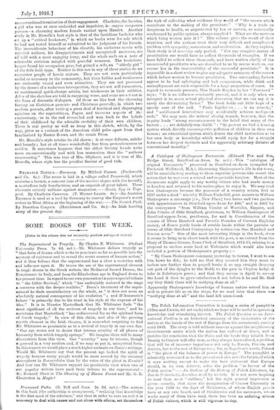A Catalogue of Shakespeare Documents. (Edward Fox and Son, Bridge
Street, Stratford-on-Avon. Is. net.)—This "catalogue of original Documents" preserved in Stratford-on-Avon (compiled by Frederick 1Vellstood, M.A.), illustrating Shakespeare's life in the town, will be unsatisfactory reading to those superfine persons who resent the notion that he was over a retired and respectable burgher. Most of the documents might apply to any worthy citizen who had made money in London and returned to his native place to enjoy it. We may read how Shakespeare became tho possessor of a country estate, first in 1597 under a deed" whereby William Underhill, gent. assures to William Shakespeare a messuage [i.e., New Place] two barns and two gardens with appurtenances in Stratford-upon-Avon for E60," and in 1602 by the conveyance "from William Combo of Warrick°, Esquier, and John Combo of Olde Stratford, gentleman, to William Shakespeare of Stretford-uppon-Avon, gentleman, for and in Considoracion of the somme of Three Hundred and Twentio Poundes of Currant English° money, of ffowro yardo lande of errablo lande within the parrishe or towno of Oldo Stretford Conteyningo by estimacion One Hundred and &maven acres." One of the most interesting things in the book, since it seems to bring us in closer touch with the poet, is an extract from the Diary of Thomas Greene, Town Clerk of Stratford, 1614-15, relating to a proposal to enclose some land at Welcombe which would also have included a portion of Shakespeare's property :— "My Common Shakespeare commyng yesterday to towne, I wont to wee him how° he did ; he told me that they assured him they ment to inclose noe further then to gospell busho & so upp straight (leavyng out part of the dyngles to the ilield) to the gate in Clopton hedge & take in Salisburyes peeco ; and that they meano in Aprill to survey the Land & then to gyve satisfaccion & not before & ho and Mr. Hall say they think there will be nothyng done at all."
Apparently Shakespeare's knowledge of human nature served him as well in private life as on the stage, for we read later that there was " nothyng done at all" and the land left unenclosed.










































 Previous page
Previous page